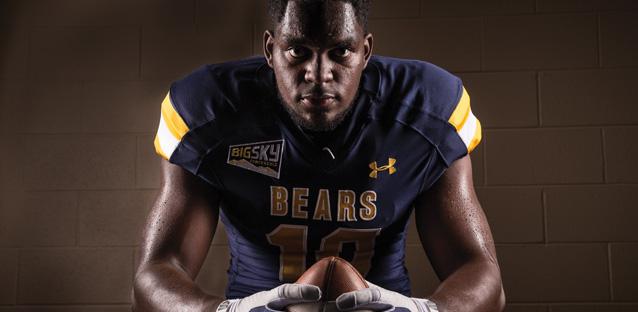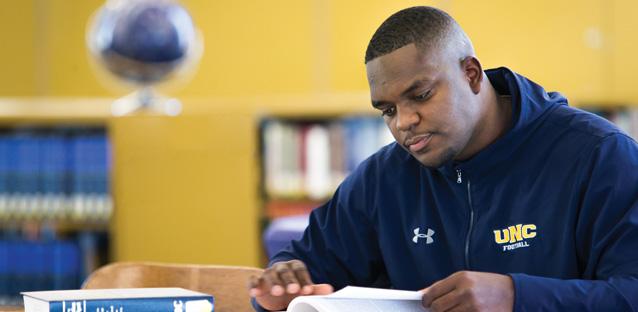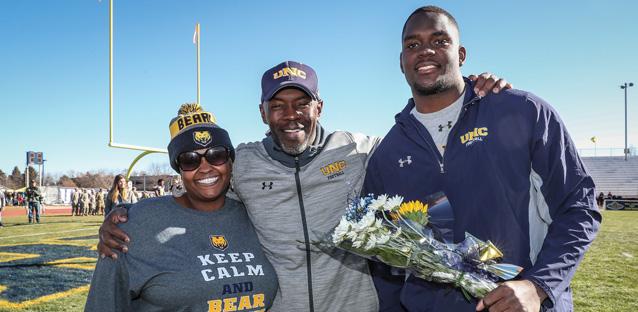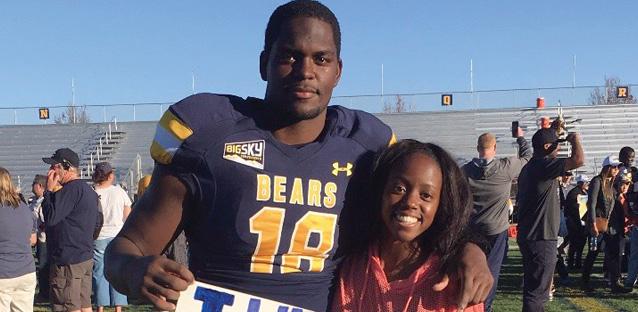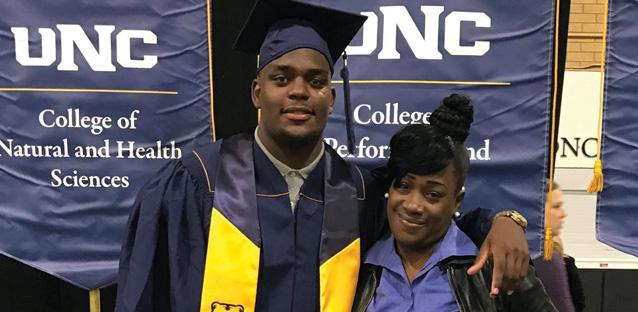Football provided a path to college and an escape from the violence of his hometown. When adversity threatened to derail him, Samad Hinds summoned determination and resiliency and found a support network to keep his goal in sight.
By Debbie Pitner Moors
As he closes in on a master’s degree in Sport and Exercise Science, Samad Hinds looks forward to a future he may not have envisioned when he was growing up in Opa-Locka, Florida.
“I was in an environment where I got to fight to survive every day,” Samad says of his hometown. “You don’t go looking for violence. Violence is always going to find you.”
Opa-Locka, about 15 miles north of Miami, is a city of about 16,000 that makes headlines for corruption and gun violence. In 2004, the FBI reported that Opa-Locka had the highest rate of violent crime of any city in the country. In 2016, the city’s violent crime rate was higher than the national violent crime rate by almost 460 percent. Less than nine percent of the population has a four-year degree.
It’s an area where the fight to get out is fueled by both hope and desperation. And that struggle for a better life may be, in part, why south Florida is known for high school football. In 2016, Florida high schools could lay claim to nearly 240 active NFL players. There, parents, players and coaches know that football is not just a game — it’s a lifeline.
***
Samad grew up playing basketball. His junior year at Miami-Dade County’s Monsignor Edward Pace High School, though, he and his teammate Damien Parms (who now plays for the Carolina Panthers) decided to also go out for football.
Samad finished his first year in the sport being named to the All-County Team. Then he transferred to Miami Central High School — a football powerhouse that has produced NFL players such as Willis McGahee, Najeh Davenport and Devonta Freeman.
Like some of the athletes who walked Central’s halls before him, Samad was determined to leave Miami behind, and he hoped football would give him that opportunity.
As he started his senior year at Central, it seemed it would.
Samad helped the Central High School Rockets win the district title that year. At 6-foot-5, and listed as the 34th best tight end in the nation, he began to garner interest from a number of schools.
He committed to the University of Minnesota. Life was headed in the right direction.
Then Samad received news that shifted his future from promising to uncertain: His ACT score was below the cutoff for NCAA qualification. Minnesota withdrew, and the chatter of college interest stilled to silence.
In a new high school where he only knew a few students, he struggled.
“My senior year of high school was one of my toughest years,” he remembers. “A lot of people said I wouldn’t make it. I had coaches and teammates telling me I wasn’t good enough to go to college, and I had people give up on me.”
But adversity is a great motivator.
“Coming from where I came from, my environment motivated me,” he says. “And so did my family.”
The second oldest of seven, Samad and his siblings were adopted by his aunt, April Hinds, who raised them on her own.
“My aunt always fought for us,” Samad says. “She didn’t want to see us get split up.”
April would tell him, “You deserve a good life.” To get there, Samad knew of two options: attend junior college for a year and then transfer, or take a year off to study and bring his ACT score into the qualifying range. He chose the latter.
Throughout his last semester at Central and after high school graduation, life seemed to follow a line from home to the library to Miami-Dade Track Park. Every day, Samad carried his football gear, which included an agility ladder — a rope-and-rung tool spread along the ground that Samad used for footwork and mobility drills.
One afternoon on his trek home, a man named Darrell Streeter called out to him.
“I had a bag on with a ladder hanging out,” Samad says.
“He said, ‘Man, I see you every day. What are you up to?’”
Samad answered that he’d played football at Miami Central and had interest from some colleges. Streeter said he was going to look up Samad’s stats. Samad went on his way, not knowing that Streeter ran Footballville Nation, an organization in Miami-Dade that works to provide role models and empower student-athletes for success.
The next day, Streeter saw him again, and this time he gave Samad something invaluable: a name. He told him to talk to Faheem Ali.
***
Nearly 20 years earlier, Faheem Ali’s story had followed a path similar to Samad’s. He showed promise as a football player in south Florida, but his test scores kept him from qualifying. He went to junior college, then played for Eastern Michigan University before transferring to Louisiana Tech. He returned to Miami and, not wanting other student-athletes to go through what he went through, founded Complete Athletes, an organization that works with kids in all sports to hit performance goals and prepare for college entrance exams.
“What I teach my student-athletes is, use this football as a vessel,” he says. “If it’s going to take you to the other side so you can use your degree, that’s what you do. But you have to get the degree.”
Ali connected with Samad.
“At this time, everybody had given up on Samad,” Ali recalls. “I think Samad had almost given up on Samad. But God has this deal to where as soon as you think you’re going to break, it opens up for you. I think I was that person to give him that second breath of fresh air.”
Ali’s parents own an elementary school, and Samad helped with sport camps and the young athletes in Ali’s program. It gave Samad a place to gain focus.
“Faheem, he was a blessing for me,” Samad says. “He bought me food, brought me to his house. He helped me, put me in ACT classes, trained me and kept paying for the tests.”
And late in 2012, Samad’s path took a turn north and west.
UNC assistant football coach Michael Armour, an Eastern Michigan University grad, knew Ali.
“I got a call from Faheem who basically told me about Samad, and that he was one point short on his ACT,” Armour says. “Coach (Earnest) Collins and I evaluated his films and decided if he got the score, we’d bring him (to UNC) in January.”
Samad got his passing score and signed a letter of intent Feb. 2, 2013, with UNC. Collins and Armour had offered a full ride and visited Samad and his aunt in Opa-Locka.
“When I signed, I was just so happy,” Samad says. “I couldn’t believe it. It was one of the best feelings in the world.”
Within weeks, Samad had flown to Colorado and visited campus.
His first impression?
“I loved it because I’d never seen anything like it,” he says.
“I just felt so much opportunity that I knew I was going to make something of my life
once I came up here.”
Collins could see that. “Samad is one of the most kind, caring young men you ever want to meet,” he says. “You knew he was trying to make a difference in the world.”
That June, Samad packed up his belongings, and Ali came by to give him a ride to the airport.
April remembers that day well.
“When he left, he told me, ‘Thank you,’” she says. “I said, ‘You’re welcome. Don’t forget to read your Bible.’”
And with that, he was on his way.
***
Leaving family was the toughest part of the transition for Samad. He called and FaceTimed them daily — no small feat when he left his dorm room at 6 a.m. and didn’t return home until 10 p.m. after a full day of studying and football practice.
“I was sad about not seeing my little brother, Jawon, because he’s autistic and he doesn’t really understand,” Samad says. “I used to hug him every day when I’d leave for school and hug him before I’d go to football practice.”
His aunt missed Samad, too, but she didn’t encourage him to come home.
“She knew how dangerous it was,” he says. “She said that if she doesn’t see me she knows I’m doing good.”
The last time Samad went home, violence in Opa-Locka hit home. It was Christmas Eve 2016, and after visiting with his brother Chevy, Samad headed over to Ali’s house. Chevy had invited him to go out with friends, but Samad decided not to go. At 3 a.m., Samad’s sister called to tell him Chevy was at the hospital. He’d been shot.
“He walked into a situation he didn’t know he was going to be in,” Samad says. “My aunt was crying because she worked so hard for us to stay out of that type of situation.”
Chevy recovered and returned to college, but it was a reminder of what Samad was leaving behind, and it continued to motivate him.
“When I first came here, I was scared, because where I’m from people don’t go to school, and the people that do go to school end up dropping out and going back into that same environment,” Samad says. “I didn’t want to be that person.”
Required to attend 10 hours of study hall each week, Samad put in 13. He divided his time between Michener Library and Butler-Hancock.
“Samad was determined to make something of himself, and that’s the thing I’m most proud of with him,” Collins says. “He decided he wasn’t going to be a statistic.”
Brian Smith, J.D., a lecturer in UNC’s Criminal Justice program, remembers taking notice during the first class Samad took with him. It was Samad’s sophomore year, and he’d just taken his first exam in Smith’s Judicial Process class. It’s a long, detailed, challenging exam.
“Samad did pretty well on that first exam,” Smith says. “And when someone does well on the first exam for me, it means they have a real aptitude. And it indicated to me that he spent a significant amount of time studying.”
Samad worked closely with Associate Director for Academic Success, Jimmy Henderson; checked in with his professors weekly; talked with them about his career path; spent time in study hall and continued to thrive. Smith says Samad mentored teammates and encouraged them to do well academically, but added that Samad doesn’t always see his own role in his success.
“He deserves an awful lot of credit,” Smith says.
***
When Samad wasn’t studying, he was working out or at practice. Playing for the Bears in 2014, he caught five passes for 73 yards. The next year, he played in 10 games and caught six passes for 85 yards. Then, a couple of injuries sidelined him.
“He was really disappointed and had a freak injury during preseason for his senior year,” Armour says. “But we told him we’re not concerned with that. We’re more concerned with him graduating and getting a four-year degree.”
Collins says academic goals have led to the most recent team GPA of 2.97 (the highest it’s been since the Bears joined Division I), and says that he and the rest of his coaching staff encourage players to think about earning their master’s while they have the opportunity.
“The thing that surprised me most was how much Coach Collins cared about me as a person,” Samad says. “He told us football is going to be over, you need to get your education and use your resources while you’re here. He just wants us to be on the right path and do the right thing. And be what you’re supposed to be.”
After three-and-a-half years at UNC, Samad earned his bachelor’s degree in Criminal Justice with a 3.1 GPA. April was there to see him receive his diploma.
“He makes me so proud,” his aunt says. “He inspires me and his brothers and sisters.”
Ali points out that since Samad left Opa-Locka, his brother and sisters have followed him along the path to education, earning athletic scholarships as well.
“Samad opened up the door for them,” he says. “He gave them hope.”
Collins agrees. “He has changed the legacy of his family. He’s an example of what you can accomplish when you just put your mind to it.”
This spring, April and Ali will both be there to watch Samad graduate with his master’s. He’s still thinking about what he wants to do with his education, but his plans may include earning a doctorate in Criminal Justice. He also plans to stay in Colorado where his girlfriend, UNC alumna and track-and-field athlete Brianna Pardner, is going to nursing school.
“Some people where I’m from don’t even make it to see 18,” he says. “No one expected me to be this far. My 16-year-old self would be amazed, and I would be happy because I would be able to see myself and say, ‘Man, look at me. I can do it. I can make it far.’” UNC

